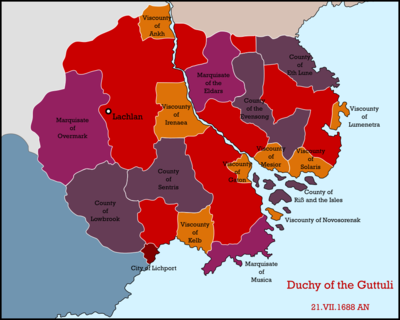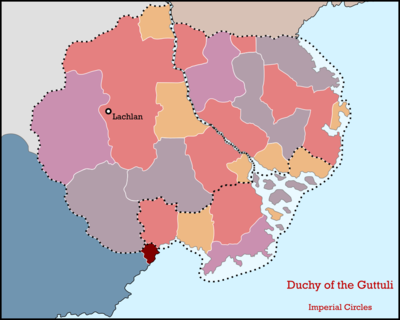Duchy of the Guttuli
| The Guttuli | |
| Subdivision type: | Duchy |
| Capital: | Lachlan |
| Population: | |
| Largest Cities: | Solaris, Gaton, Kelb |
|
| |
| Local Leadership Title: | The Duchess |
| Local Government: | Dukedom |
| Current leader: | Salome |
|
| |
| Local language: | Præta, Istvanistani, Laqi |
| Local Religion: | Cedrism |
The Duchy of the Guttuli is a constituent territory of the Imperial Republic of Shireroth, located at the mouth of the River Elwynn, following the Kalirion Fracture. The name Guttuli comes from the ancient Gates of the Guttuli at the mouth of the Red Elwynn.
Until 1687 AN, the territory had been governed by a criminal state that called itself the Guttuli Protectorate. After the fall of the Protectorate and the declaration of the Duchy, the Guttulinese region began to undergo a period of reconstruction, intended to uproot the ideological and material harm that the Protectorate had inflicted upon the Guttuli.
Governance
Initially, the Duchy of the Guttuli was governed directed through the two Lieutenancies that were established in its territory, that of Far Guttuli (Guttulinese territory east of the River Elwynn as well as islands located therein) and that of Near Guttuli (Guttulinese territory west of the River Elwynn). By V.1687 AN, the two Lieutenancies independently chose to appoint a Coordinating Committee, consisting of a mixture of Imperial courtiers, senior Laqi officers, and the few anti-Protectorate locals with some measure of means. The Coordinating Committee for the Guttuli would issue directives and coordinate resource allocations across the duchy as necessary to rebuild the economy, stabilize the ongoing humanitarian crisis, and construct a new political structure after the previous one had been wiped clean.
A basic law for the Duchy of the Guttuli was received by the beginning of 1688 AN, and, with some revisions to accommodate the Kaiseress's comments, approved via Imperial Decree on 21.VII.1688 AN. Also included in that decree was the creation of new noble titles, designed to fit with the structure set out by the new basic law for regional governance.
Administrative Divisions
The Duchy of the Guttuli is organized into feudal estates (marquisates, counties, viscounties) and public lands. Revenues from the public lands are paid directly to ducal coffers, while revenues from the feudal estates are paid to the estate holder, with a portion then paid upwards to the ducal coffers in accordance with the relative dignity of the holder.
Imperial Circles
The Basic Law for the Guttuli organizes the Duchy into three Imperial Circles:
- Near Guttuli Circle
- Far Guttuli Circle
- Coastal Guttuli Circle
Each of the three circles maintain a Circle Court, for the purpose of serving as a legal court of appeals and equity, administrative oversight for their constituent subdivisions, and to issue grants for the use of public lands. Each Circle Court is composed of the feudal title holders in that circle, with relative voting based upon titular rank, and holds court twice a year for a length of term as necessary to complete open business on the docket.
The City of Lichport is governed independent from the Imperial Circles, maintaining its own court of appeals and equity, and directly under the Ducal government.
Economy
Population
Rehabilitation of Protectorate Conscripts
From 1687 through 1689 AN, Imperial forces in the Guttuli oversaw deprogramming and filtering of POWs who had been placed into protective custody, identifying and dividing hard-line versus compliant prisoners. In late 1690 AN, a decree ordered that those deemed most compliant could be remitted to their local communities, with some degree of limited freedom of movement and association during daylight hours. This boost in young adult workers under the authority of the estates granted them a labor pool for law enforcement and infrastructure reconstruction.
One of the major logistical hurdles for these returning soldiers was providing adequate psychological services, with a great many of them suffering from post-traumatic stress disorder, suicidality, and anxiety, related to their actions during the Protectorate. These conditions were expressed most acutely among those who had been returned to the Far Guttuli Circle, where the Protectorate's crimes had been most severe.
Military
The Guttuli Protectorate's heavy assets were deployed forward for the majority of the war, leaving little in terms of mechanized, armored, or artillery vehicles available to be seized. The ideological programming used by the Protectorate government during training and on maneuvers also left a large portion of the Protectorate military unavailable for peacekeeping operations in the region. As such, the Duchy of Guttuli would have had to rebuild much of its military from scratch.
Sea Corps of the Guttuli
Reorganized from the remains of the Guttuli Protectorate's naval assets, the Sea Corps was initialized in 1690 AN, with its primary mission to cut down on piracy that had begun plaguing the region since 1687 AN. Training for this entirely new military formation was contracted out from Alduria-Wechua, which included modernizing the patrol boats and corvettes that had been deemed recoverable.
The Sea Corps operates out of Lichport, due to its relatively-undamaged harbor facilities.
| Ship | Protectorate Name | Type |
|---|---|---|
| Poema | PS Bætrsuir | Bætrsuir-class Corvette |
| Tantilla | PS Kulïulk | Bætrsuir-class Corvette |
| Valla | PS Hahhars | Bætrsuir-class Corvette |
Ducal Army of the Guttuli
On 1.I.1694, local peacekeeping forces, which had been assembled by the estates in order to enforce the Kaiseress's Peace, were reorganized into a singular Ducal Army of the Guttuli (Pr. Hohtuïs Hohm ïis Guttulin). Training camps were established at Ramden (Ducal Estate of Farren), Rishal (City of Lachlan), and Eastern Liberty (Ducal Estate of Pratum), with training support provided by the Palatini Corps at all locations and by Ć'eleiedźak'o'azeh, Tyġoryġwh, and Pesyk'oś'wyc'eh at each location.
Infantry would continue to be recruited according to their feudal estate, designated now as Departments ( Pr. Tuszæl) and organized into Cohorts ( Pr. Gauht). Other arms and support formations would recruit similarly, according to the three imperial circles.
| Formation | Cohorts | Role |
|---|---|---|
| Barhuss Tuszæl Kelb | 3 | Mechanized Infantry |
| Holïurs Tuszæl Næhguttuli | 3 | Self-Propelled Artillery |
| Holïurs Tuszæl Ferguttuli | 2 | Self-Propelled Artillery |
| Holïurs Tuszæl Strannsguttuli | 1 | Self-Propelled Artillery |
| Bruns Tuszæl Næhguttuli | 3 | Armor |
| Bruns Tuszæl Ferguttuli | 1 | Armor |
| Bruns Tuszæl Strannsguttuli | 2 | Armor |
| Near Guttuli | ||
| Hohtuïs Tuszæl Alsin | 4 | Motorized Infantry |
| Hohtuïs Tuszæl Fleming | 2 | Motorized Infantry |
| Hohtuïs Tuszæl Hathurn | 2 | Motorized Infantry |
| Hohtuïs Tuszæl Farfour | 2 | Motorized Infantry |
| Hohtuïs Tuszæl Carrihuy | 2 | Motorized Infantry |
| Hohtuïs Tuszæl Lachlan | 2 | Motorized Infantry |
| Tuszæl Overmark | 4 | Mountain Infantry |
| Tuszæl Lowbrook | 3 | Motorized Infantry |
| Tuszæl Sentris | 3 | Motorized Infantry |
| Tuszæl Ankh | 2 | Motorized Infantry |
| Tuszæl Irenaea | 2 | Motorized Infantry |
| Tuszæl Gaton | 3 | Motorized Infantry |
| Far Guttuli | ||
| Hohtuïs Tuszæl Tantilla o Valla | 2 | Motorized Infantry |
| Hohtuïs Tuszæl Diusagra | 2 | Motorized Infantry |
| Hohtuïs Tuszæl Pratum | 2 | Motorized Infantry |
| Hohtuïs Tuszæl Podestus | 2 | Motorized Infantry |
| Tuszæl Evensong | 3 | Motorized Infantry |
| Tuszæl Eth Lune | 3 | Motorized Infantry |
| Tuszæl Mesior | 2 | Motorized Infantry |
| Tuszæl Lumenetra | 2 | Amphibious Infantry |
| Coastal Guttuli | ||
| Hohtuïs Tuszæl Farren | 3 | Motorized Infantry |
| Hohtuïs Tuszæl Rinerund | 4 | Motorized Infantry |
| Tuszæl Musica | 4 | Motorized Infantry |
| Tuszæl Riß | 2 | Amphibious Infantry |
| Tuszæl Novosorensk | 2 | Amphibious Infantry |
| Tuszæl Solaris | 4 | Motorized Infantry |
On 16.II.1697 AN, orders were drawn up to begin field deployment of the newly-trained army, and to perform exercises. These deployments were placed under a unified command of a Ŝḥenĉeł'yh Nypḥyk'u and named the the Lockenhasp Association, deployed along the border with Ransenar, and the Lowbrook Association, deployed along the border with Drak-Modan.
This deployment allowed for the thinning out of Brookshire troops deployed along these locations, having been a regular feature maintaining the peace in the Guttuli at the end of the war.
Lockenhasp Association
Standard Bearer: Kyt Tḥak'ušynin
Lowbrook Association
Standard Bearer: Lyn Ityqu Lynnaśei, Count of Lowbrook


